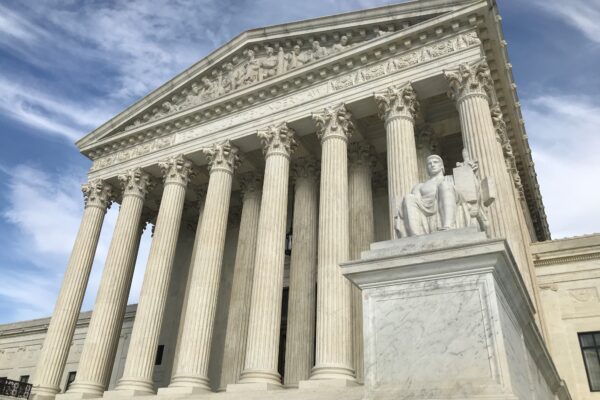FOR IMMEDIATE RELEASE
WASHINGTON — The American Civil Liberties Union appeared before the Supreme Court today in oral arguments for R.G. & G.R. Harris Funeral Homes v. EEOC & Aimee Stephens and Altitude Express v. Zarda (a third case, Bostock v. Clayton County, Georgia, had been consolidated with Zarda), cases that could chart the future of workplace anti-discrimination protections in the United States.
Stephens, whom the American Civil Liberties Union and the ACLU of Michigan represent, was fired from her job after coming out as transgender, and the Sixth Circuit Court of Appeals ruled that her firing was a form of sex discrimination that violates Title VII of the Civil Rights Act. Five federal appeals courts and dozens of federal district and state courts have affirmed that view, ruling that existing federal laws protect transgender people from discrimination.
Donald Zarda was fired from his job after a client learned he was gay, and the Second Circuit Court of Appeals ruled that his firing was a form of sex discrimination that violates Title VII of the Civil Rights Act. The Seventh Circuit has also ruled that firing someone because of their sexual orientation is a form of sex discrimination, as has the federal Equal Employment Opportunity Commission, which investigates charges of workplace discrimination nationwide.
Zarda died in an accident in 2014. His surviving partner, Bill Moore, and his sister, Melissa Zarda, have continued the lawsuit on behalf of the estate. The American Civil Liberties Union represents the estate as co-counsel with Greg Antollino of Antollino PLLC and with Pam Karlan and Jeff Fisher of the Stanford Law School Supreme Court Litigation Clinic.
This is a key judicial test of the Department of Justice’s efforts to deny LGBTQ people protection from sex discrimination. Should the Supreme Court overturn the lower courts’ rulings, it would take away existing protections from lesbian, gay, bisexual, and transgender employees, saying that it is lawful under federal law to fire LGBTQ people for their gender identity or sexual orientation.
“These cases will have a profound effect on the lives of millions of people,” said David Cole, legal director of the ACLU, who argued today’s case on behalf of Aimee Stephens. “The LGBTQ community has won hard-fought protections in courts before, and we are hoping the justices will not turn back the clock on equality and justice. No one should be fired because of who they are.”
Aimee Stephens had the following reaction to today’s arguments:
“I am thrilled to be at the highest court in the land today to remind the justices with my presence that women like me exist, and that trans people have every right to the same protections as everyone else. Firing me because I’m transgender was discrimination, plain and simple, and I hope the Court rules that no one has to endure the harm and suffering my former employer forced me to experience.”
Melissa Zarda had the following response:
“My brother Don was my rock, my everything. I stood in the Supreme Court today to honor his memory and continue the fight for fairness that he would want me to continue. I believe that in this country, you should not be fired for being gay, and I hope that the Court recognizes that what happened to Don was wrong and should never happen again.”
Stay Informed
Sign up to be the first to hear about how to take action.
By completing this form, I agree to receive occasional emails per the terms of the ACLU’s privacy statement.
By completing this form, I agree to receive occasional emails per the terms of the ACLU’s privacy statement.

